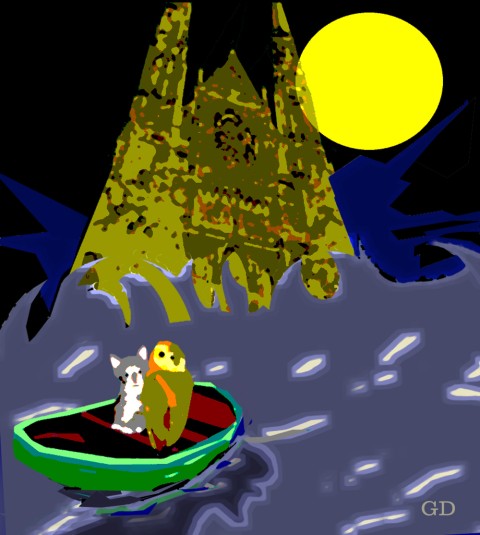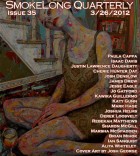I called Johnboy “Uncle” even though he wasn’t a brother to anyone. But he acted more like an uncle than my real one, whose only duty appeared to be to tickle me, until tickling became inappropriate, at which point we sat on the floor and tickled the cat.
He called himself “an unofficial carpenter” and fitted the wardrobes in my parents’ room, fixed the street’s fence panels after a high wind, and carved twisted bails out of driftwood for the cricket team. In the summer, when children disappeared after breakfast and didn’t come home until suppertime, their mothers knew more often than not they could be found at the beach, begging Johnboy for stories or treasure.
Johnboy went to sea in a beautiful pea green boat that he called The Shannon. She was his pussy cat, and he was an unwise owl, he said. He called me little piggy and said he’d bring me back a ring for my nose. He only went to church on Christmas Eve, and usually when drunk, but he thanked the singular God for calm seas and raged against Poseidon when he came back with eyes black and deep inside his face from staying awake on vicious water.
“It makes sense to have so many,” he said, of the multiplicity of Gods he told me about. “That way you’re always pleasing somebody, always pissing off another, just like life.”
He never brought me back a ring, but he once made me a paperclip bracelet while frying up Matzo pancakes on his little petrol stove, because the Beckers were celebrating Passover and wouldn’t let me come to tea. “It was a simpler time,” he said, as if he had been there, “When you could just swallow your children if you didn’t like the look of them. Or turn into a swan and get your end away.” It sounded funny, even if I didn’t know what he meant.
He told me about Saint Bartholomew’s—the backstreet church that stretched three or four stories high but only contained one massive room that echoed each footfall for days. He said it was modelled on The Ark, tipped upside down, ready to sail again if the world goes to shit. I told him bricks can’t float, and the horrible thing had no windows, so all the people would get sick. “That’s a good point,” he said, “but who says He’d save any people? That was Big G’s mistake last time, bringing Noah and his bods along.”
St Bart’s used to have a good school attached to it, but then the London Road build up alongside and became just an exhaust-filled thoroughfare, flanked with interchangeable shops and walked incessantly by bad-toothed, shouting couples who drank out of beer cans at nine-thirty in the morning.
Johnboy spent a lot of time on London Road.
On 9/11, when the world walked around with their eyes in the air, he said the open-all-hours supermarket sprang a leak out the back of their bakery kitchen. The road up to the church became a river and they had to shut the monolith to the public. “It could have been Ark time,” Johnboy said, serious as the heart attack he’d have the following year, “It was a warning, maybe. September the eleventh is the day they drowned old Bart.”
He scratched a crusty eyebrow with a spade-like nail and leaned in towards me as if he was still re-adjusting to balancing on land. “Of course there are those who say he got skinned alive, instead. And beheaded. And crucified upside down. Perhaps they did all of them to him, the poor bugger, before they threw him into the sea.”
It was only after he had to sell his boat that I found out he lived on it. Though I begged my parents to take him in, and they seemed like they were truly sorry, he said he preferred sleeping on the hill above St Peter’s—it felt the most like rolling on a marina tide. I asked him why not St Bart’s and for the first time he didn’t smile when he answered one of my questions.
“Kiddo, I’m as afraid of that place as you are. It’s a tomb, and nothing good ever came out of London Road.”
I expected him to tell me the story of St Peter, but the next time I saw him he didn’t recognise me at first and asked me for spare change. I bought him some tea and he put his arm around me and whispered about his heart attack and when I cried he caught a tear in his polystyrene cup and said: “Lacrimosa, my dear. When the guilty rise, God is merciful. And if He’s not, then I’ll find another who is.”


